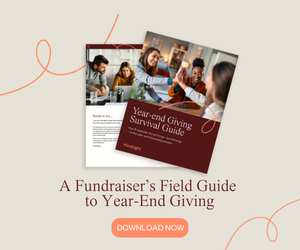What Will Fundraising Look Like in 2019: Overrated Trends

Part I: What will be the primary trends and developments in fundraising in 2019?
Part II: What’s the one main thing your organization is going to be focusing on in 2019 with regards to fundraising, or what are you going to advise your clients, etc.?
Not every idea is a winner, and not every charity is ready to take on the latest trend. We asked AFP members what trend or issues they think are overrated for 2019 or are ones that fundraisers need to approach with more caution, understanding and/or nuance. Here’s what they said!
Mazarine Treyz, CEO, Wild Woman Fundraising, Portland, Ore.: I think the trend of GivingTuesday is overrated. Some people get a fair bit from it, but many people get very little. One thing that I've seen done well is community foundations helping their grantees make the most of GivingTuesday by providing all of the infrastructure, follow-up emails, and communications calendars. I just did a workshop for the Kitsap Community Foundation last year that helped their grantees keep their Giving Day donors. I'm about to do another one for the Orcas Island Community Foundation. If more grantors would be forward-thinking about capacity building, instead of just giving out small grants here and there, they would have more self-sustaining nonprofits, and really, don't we all want that?
Scott Decksheimer, CFRE, President and CEO, The Vitreo Group, Calgary, Alberta: Besides bitcoin, text-to-give programs are not for everyone—as are many of the digital tools that require many small gifts.
Amy Eisenstein, ACFRE, Principal, Amy Eisenstein, LLC, Westfield, N.J.: Most trends are overrated. That’s what makes them trends. A few stick, but most don’t. That being said, I believe it’s important to try new things. Fundraising is a field where there should be evidence-based experimentation. So, go ahead and follow the trend. Test what works and what doesn’t at your organization. Next year, there’ll be a new trend to follow.
Roger Ali, MBA, CFRE, President and CEO, Niagara Health Foundation, Welland, Ontario: The use of data analytics, business intelligence and AI in fundraising are areas to understand more with an eye towards the long-term and the expectation to deliver greater revenue on a much more consistent basis in the future.
Martha Schumacher, CFRE, ACFRE, MInstF (AdvDip), President and Founder, Hazen, Inc., and HILT, Washington, D.C.: I'm personally and professionally fascinated with the cryptocurrency movement and its potential impact on philanthropy. That said, we saw a huge decline in Bitcoin value towards the end of 2018. Use caution and do your homework before encouraging and accepting gifts of crypto-assets.
Identifying, recruiting and retaining a more diverse pool of donors, staff and other stakeholders is a wonderful goal. In fact, studies have shown that promoting greater staff diversity is not only the right thing to do, but it actually increases productivity and creativity in the workplace. Make sure, however, that you have diversity experts on hand as you make these significant changes to your organizational culture. Whether you realize it or not, your personal implicit biases will influence the way you pursue diversity (and yes, we ALL have implicit biases!). To learn more about implicit race and gender bias, take this short test: www.understandingprejudice.org/iat.
Lynne Wester, Founder and Principal, Donor Relations Guru, Austin, Texas: I would say that GivingTuesday falls into this category. It is a crowded space. I'm happy the day exists for our industry, but I'm unsure if it is the right approach for everyone. How will your organization stand out in the crowd from others? I think some organizations should do what charity: water did this year and spend the day in gratitude. There is never enough gratitude to go around. Donors aren't screaming about being over-thanked, but they are complaining about being over-asked. Keep that in perspective. I really think organizations need to understand the ROI of their role in the day and the efforts that go into a successful day. It's not just about a social media post and an email if that's the only time your donors hear from you since the last time they gave. Just pause and think about the feeding frenzy.
Rachel Hutchisson, Vice President, Corporate Citizenship and Philanthropy, Blackbaud, Charleston, S.C.: The tax law changes in the U.S.—make sure it’s not all speculation. Look at the data as the year unfolds to see what’s actually happening to your organization.
Andrea McManus, CFRE, Partner, The Vitreo Group, Calgary, Alberta: YES, MILLENNIALS! Could we please just stop talking about them and just do it! I see too many organizations spending so much time on trying to understand millennials they are suffering from analysis paralysis. Just do it!
Gail Perry, International Fundraising Consultant, Fired Up Fundraising, Chapel Hill, N.C.: We are all unhappy with all the billions sitting in tax-sheltered donor-advised funds. I think we need to speak out about the fact that these funds are not being distributed to charity for public good. Instead the billions are simply being held by the major investment funds, who have no incentive to encourage giving. DAF's are frequently not about philanthropy. They are more often simply a tax-sheltered investment strategy. Alas!



